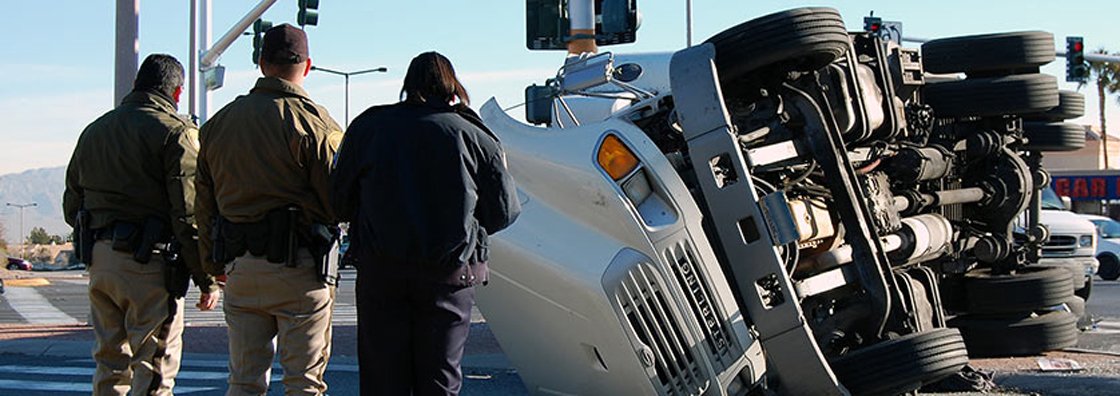Truck Accidents
Commercial trucks are the backbone of Canada's economy. From hauling fresh produce to hauling construction supplies, these behemoth vehicles keep supply chains rolling from province to province. But when a truck is involved in an accident, the results can be catastrophic because of the vehicle's size and weight.

Truck Accident Statistics in Canada
Truck accidents do not exist as isolated events. Transport Canada reports that there were:
- 36,031 commercial vehicle crashes in 2021
- 343 deaths and more than 800 serious injuries
- A 6% rise in overall road deaths in 2022, to 1,931 fatalities
These statistics underscore the massive public safety issue represented by large commercial vehicles.
Common Causes of Spinal Cord Injuries in Canada
Spinal cord injury usually results from unexpected trauma. More than 4,300 Canadians experience spinal cord injury each year, and the majority are due to:
Accidents tend to happen on major highways such as the Trans-Canada Highway or near metropolitan areas such as Toronto, Vancouver, and Calgary, where truck as well as commuter traffic is dense.
Who’s Legally Responsible After a Truck Accident?
Truck crashes tend to have multiple levels of liability. Here is the breakdown of possible responsible parties:
- Truck Driver: If the driver was speeding, distracted, intoxicated, or sleepy.
- Trucking Company: For inadequate driver training, negligent hiring, or faulty maintenance.
- Vehicle Manufacturer: If a mechanical failure (such as brake failure or steering malfunction) was involved.
- Cargo Loaders: If careless loading caused loss of control or cargo spills.
- Maintenance Contractors: Where a third-party did not properly service the vehicle.
In Canada, liability is typically established under tort law, i.e., the injured party has to establish negligence. Provinces such as Alberta and Ontario also have no-fault insurance systems, but these do not exclude lawsuits in cases of serious injury or wrongful death.
Legal Requirements for Trucking Insurance in Canada
The Canadian government has stringent insurance requirements for commercial trucks, especially those crossing international or provincial boundaries. Mandatory coverages usually comprise:
Public Liability Insurance:
- Minimum $200,000 (local trips)
- $1 million to $5 million if carrying hazardous materials or crossing internationally
Depending on the extent of your injury (e.g., complete SCI), you might qualify for greater benefits. You might also sue the at-fault party in a tort action for:
Cargo Insurance:
Accident Benefits (Section B Insurance in Alberta): Pays for medical costs, lost income, and rehabilitation, independent of fault
In Ontario, for example, trucks over 4,500 kg must be registered under the Commercial Vehicle Operator’s Registration (CVOR) system, which includes safety ratings and audit compliance.
Time Limits to File a Claim
Failing to act quickly can jeopardize your ability to get compensation. Every province has time limits:
- Ontario: Notify your insurance company within 7 days and file an accident benefits claim within 30 days
- Alberta & B.C.: The time limit for personal injury claims is usually 2 years from the accident date
- Quebec: Somewhat different because of a public insurance system (SAAQ), but victims can still sue for damages in certain situations
Compensation Available for Victims
If you’ve been hurt in a truck collision, you could be entitled to compensation that is more than minimal insurance benefits:
Medical and Rehabilitation Expenses
Includes hospitalization, surgeries, drugs, physiotherapy, and mobility equipment. Long-term care can be added as well.
Loss of Earnings
When injuries hinder you from resuming work, lost wages and potential future income can be claimed.
Pain and Suffering
Non-economic damages for bodily pain, mental trauma, PTSD, or decreased enjoyment of life.
Property Damage
Repair or replacement of your vehicle and personal items inside.
Out-of-Pocket Expenses
Visits to appointments, home adjustments, or nursing care at home.
Wrongful Death Claims
For those who’ve lost a family member, recovery can include funeral costs, loss of companionship, and financial support lost.
Why You Need a Truck Accident Lawyer in Canada
Truck accidents are technically and legally complicated. Compared to an ordinary auto collision, truck accidents have numerous parties involved, federal transportation laws, and commercial insurance.
Here’s how a Canadian truck accident attorney can assist:
- Investigate the Scene: They will collaborate with accident reconstruction specialists and ask for black box data (Event Data Recorders) from the truck.
- Handle Insurance Companies: Insurance companies tend to make lowball offers. A lawyer will safeguard your rights.
- Identify All Responsible Parties: Not just one, but potentially more than one party, owes you damages.
- Deal with Lawsuit Filings and Court Appearances: Particularly necessary if negotiations break down or the case has serious injuries or wrongful death.
- Get the Maximum Compensation: Lawyers understand what your case is worth and will negotiate a fair settlement or trial judgment.
Being hurt in a truck wreck is life-changing, but you don’t have to face what comes next by yourself. Having an idea of your legal rights, insurance benefits, and time limits to act is critical. The quicker you consult with a personal injury attorney experienced in Canadian trucking law, the better off your case will be.
